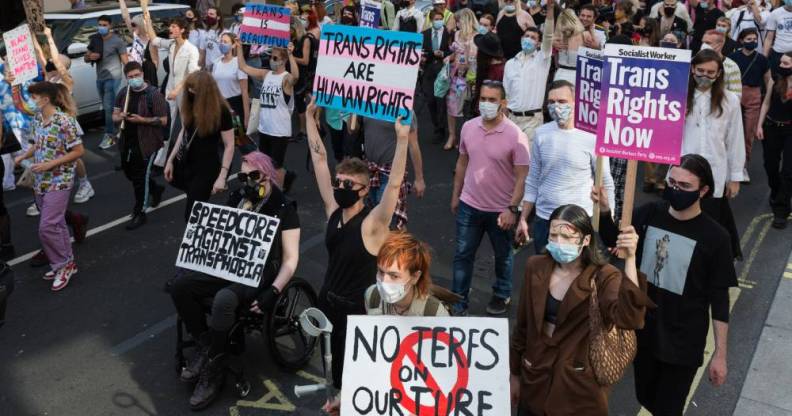Retired Old Bailey judge suggests anti-trans groups should help reform hate crime law

Transgender people and supporters march through central London during the second Trans Pride protest march for equality on 12 September 2020. (Photo by Wiktor Szymanowicz/Barcroft Media via Getty Images)
A retired Old Bailey judge has questioned why anti-trans groups such as the LGB Alliance weren’t included in a consultation on hate crime laws.
Charles Wilde, who worked as a senior circuit judge at the Old Bailey from 2011 to 2016, shared his concerns regarding a consultation by the Law Commission, which advises the government on legal reform in England and Wales.
The commission is currently consulting on whether hate crime laws should be expanded to cover misogyny, age, sex workers, homelessness, alternative subcultures and philosophical beliefs.
In an essay published on Tuesday (4 May) for the think tank Policy Exchange, Wilde said that he believes the commission has relied on a “limited range of academics and organisations” when it came to the consultation.
He argued the commission had not heard from the “full variety of academic voices, organisations, commentators and members of the general public who have no organisation to speak for them” when it came to expanding hate crime laws.
Wilde directly targeted Stonewall in his essay, saying the Law Commission used the LGBT+ charity more like a “consultant, as opposed to a consultee”. He said the commission had placed “significant reliance on information” and opinions provided by Stonewall and other “like-minded organisations and individuals”.
Wilde suggested this could harm free speech and those who want to challenge positions on gender.
He wrote: “Rightly, the interests of those who might be protected are considered in detail but little attention has been paid to those who might suffer, or fear suffering, the consequences of laws being too widely drawn or misused.”
Wilde said there are people “who dare not speak freely on these topics for fear that they may be putting their careers at risk”. Others fear the “threat of the Twitter storm” or a “visit by the police” as the “result of a politically or personally motivated complaint”.
He noted that “one of the sharpest contemporary disputes concerns whether sex (as an immutable biological fact from birth) should be at the centre of public policy and should not be confused with theories about gender”.
Wilde referenced articles published by The Spectator which “documented the climate of fear generated by activists in the gender/trans debate”. The Spectator has faced harsh criticism from LGBT+ activists in the past over anti-trans content, including former Stonewall CEO Ruth Hunt
He added the Law Commission had not spoken “as can be discerned” to “any organisations such as Women’s Place UK and the LGB Alliance” – both of which campaign against trans rights – or to “academics or commentators who dissent from what is presented as the new orthodoxy”.
The LGB Alliance in particular has been branded a “hate group” by many organisations and individuals in the LGBT+ community, with the recent decision by the Charity Commission to give it charity status widely condemned. In December 2020, Ofcom boss Melanie Dawes told MPs it’s “entirely inappropriate” to quote the LGB Alliance on trans-related issues.
A spokesperson for the Law Commission told PinkNews that the consultation included “organisations and individuals with a broad range of views”, and that it had received “over 2,500 responses to the hate crime consultation demonstrating that it has been thorough, open and fair”.
The spokesperson said the commission is “carefully considering” these responses and will be presenting a final report later this year.
“Hate crime is a complex and sensitive area of the law and, while the commission can recommend options for legal reform, it will ultimately be for government and parliament to decide which of these recommendations to implement,” the spokesperson said.
Kieran Aldred, head of policy for Stonewall, told PinkNews that the consultation was crucial because LGBT+ people “continue to face discrimination and abuse on a daily basis just for being themselves”. He added the Law Commission’s review of hate crime laws is an “important opportunity to review how legislation is protecting our communities from hate crime”.
“We want to see the law reformed so that crimes based on sexual orientation, transgender identity and disability are treated equally to those based on race and faith,” Aldred said. “This will help improve confidence in the way the criminal justice system deals with LGBT+ hate crime.”

